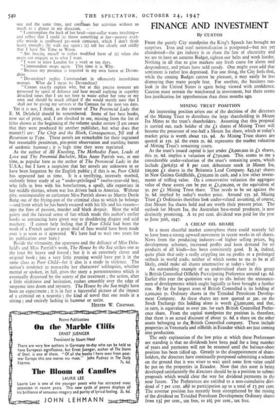FINANCE AND INVESTMENT
By CUSTOS FROM the purely City standpoint the King's Speech has brought no surprises. Iron and steel nationalisation is postponed—but not yet abandoned—the gas indusry is to share the fate of electricity and we are to have an autumn Budget, tighten our belts and work harder. Nothing in all that to give markets any fresh cause for alarm and despondency, and prices have odd steady. One might even add that sentiment is rather less depressed. For one thing, the City feels that, while the coming Budget cannot be pleasant, it may easily be less dismaying than many people fear. For another, the business out- look in the United States is again being viewed with confidence. Caution must remain the watchword in investment, but there seems less justification for apprehension than three months ago.
MINING TRUST POSITION
An interesting position arises out of the decision of the directors of the Mining Trust to distribute the large shareholding in Mount Isa Mines to the trust's shareholders. Assuming that this proposal is carried out, each holder of the £1 shares of Mining Trust will become the possessor of one-half a Mount Isa share, which at today's market price is worth about 12s. 9d. As Mining Trust shares are quoted at 15s. 3d. the extra 2S. 6d. represents the market valuation of Mining Trust's remaining assets. As the trust's issued capital is just under £6,000,000 in LI shares, this 2S. 6d. implies a valuation of £750,000. This seems to me a considerable under-valuation of the trust's remaining assets, .which include £916,632 of 8 per cent. debenture stock in Mount Isa, too,000 £r shares in the Britannia Lead Company. 843,147 shares in New Guinea Goldfields, £250,000 in cash, and a few other invest- ments of trifling value. -(:)n a conservative valuation the aggregate value of these assets can be put at £1,5oo,000, or the equivalent of 5s. per £x Mining Trust share. That needs to be set against the 2s. 6d. implied by today's market price. Around 155. 3d. Mining Trust Li Ordinaries therefore look under-valued, assuming, of course, that Mount Isa shares hold and are worth their present price. The outlook for Mount Isa, the Australian base-metal producer, is pow distinctly promising. A to per cent. dividend was paid for the year to June 3oth, 1947.
A CHEAP OIL SHARE
In a more cheerful market atmosphere there could scarcely fail to have been a strong upward movement in recent weeks in oil shares. News from the producing industry—of higher selling prices, big development schemes, increased profits and keen demand for oil products of all kinds—has been consistently good. It is, indeed, quite plain that only a really crippling tax on profits or a prolonged setback in world trade, neither of which seems to me to be at all likely, could make oil shares unattractive at today s
An outstanding example of an undervalued share in this group is British Controlled Oilfields Participating Preference around 14s. 6d. Earlier this year the quotation was up to 18s. before the announce- men of developments which ought logically to have brought a further rise. By far the largest asset of British Controlled is its holding of 2,000,000 5s. Ordinary shares in the Trinidad Petroleum Develop- ment Company. As these shares are now quoted at 3os. on the Stock Exchange this holding alone is worth L3,000,000, and that, in turn, is equivalent to over 20S. for each British Controlled Prefer- ence share. From the capital standpoint the position is, therefore, that there is an actual discount of about 5s. 6d. a share on the other assets belonging to the, British Controlled company. These include properties in Venezuela and oilfields in Ecuador which are just coming into production.
The only explanation of the low price at which these Preferences are standing is that no dividends have been paid for a long number of years and payments will not be resumed until the balance-sheet position has been tidied up. Greatly to the disappointment of share- holders, the directors have continually postponed submitting a scheme on the ground that it was wiser to wait until some firm value could be put on the properties in Ecuador. Now that this asset is being developed satisfactorily the directors should be in a position to submit proposals which would clear the way for dividend payments in the near future. The Preferences are entitled to a non-cumulative divi- dend of 7 per cent. Ad to participation up to a total of 13 per cent. The revenue position has recently been strengthened by the raising of the dividend on Trinidad Petroleum Development Ordinary shares from 13k per cent., tax free, to 164- per cent., tax free.
































 Previous page
Previous page